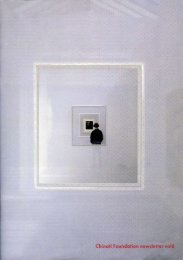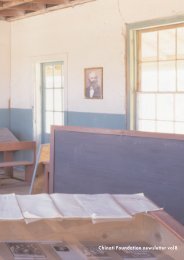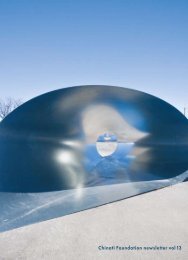Untitled - The Chinati Foundation
Untitled - The Chinati Foundation
Untitled - The Chinati Foundation
Create successful ePaper yourself
Turn your PDF publications into a flip-book with our unique Google optimized e-Paper software.
students identified themselves with<br />
the college…. <strong>The</strong>y felt responsible<br />
for what was happening to it and<br />
they knew that it was their doing that<br />
made the college.” In some sense it<br />
was simply a practical matter. “You<br />
knew that if you didn’t shovel the<br />
snow or the coal or whatever it was,<br />
you would be cold and you couldn’t<br />
drive and the whole thing wouldn’t<br />
function. It depended on the contribution<br />
of everyone and everyone’s<br />
work was valued and counted and<br />
everyone therefore knew of his identity.<br />
You weren’t just one little wheel<br />
in the big running of a big university…you<br />
had to function if the whole<br />
was to function.” 39<br />
Richard Lippold, who participated in<br />
the last Albers-run Summer Art Institute<br />
in 1948, could distinguish the climate<br />
of freedom at Black Mountain<br />
from that at other progressive schools<br />
where “the teachers were sort of there<br />
just to let [the students] do what they<br />
wanted.” At Black Mountain College<br />
he found “a very different situation<br />
because of Albers’s and one or two<br />
other teachers’ work discipline…. Albers<br />
demanded performance.” Black<br />
Mountain, Lippold concluded, was<br />
held together by “the exquisite and<br />
delightful balance of the freedom of<br />
personal life… of the students, free<br />
to learn about themselves and their<br />
relationship to life, to each other…<br />
against the necessity to perform in<br />
their classes as at least demanded<br />
by Albers and a couple of the other<br />
people.” Lippold, who discerned the<br />
contentions and stresses that were<br />
beginning to pull the place apart,<br />
marveled at the energy it took to<br />
maintain the fragile balance. He was<br />
witness to the uniqueness of Black<br />
Mountain College at its precise tipping<br />
moment. After that “there was<br />
not the energy…there was only the<br />
dreaming…it was a lost cause.” 40<br />
<strong>The</strong> personalities, circumstances,<br />
events, statements, recriminations,<br />
and misunderstandings—documented<br />
and undocumented, remembered<br />
and forgotten—that finally sent Black<br />
Mountain College over the edge are<br />
so many, so vague, and so tangled<br />
as to spin a tale that can be told in<br />
an infinite number of permutations.<br />
In the end, perhaps, “what it boils<br />
down to… is that having to be always<br />
willing to give ground and adjust<br />
and change and evolve…gets to<br />
be very tiring.” 41 Albers treasured a<br />
vision of Black Mountain College as<br />
the harmonious, creative world that,<br />
at its best, it most certainly was. <strong>The</strong><br />
conflict between his devotion to his<br />
teaching and his students on the one<br />
dad por lo que ocurría y sabían que sus<br />
esfuerzos habían ayudado a formar la<br />
institución.” En cierto modo era simple-<br />
mente un asunto práctico. “Sabías que<br />
si no paleabas la nieve o el carbón, o<br />
lo que fuera, pasarías frío y no podías<br />
manejar, y todo dejaría de funcionar.<br />
Todo dependía de la contribución de<br />
todos: se valoraba el trabajo de cada<br />
quien, y por eso cada quien sabía cuál<br />
era su identidad. No eras sólo una pie-<br />
za insignificante en una gran máquina;<br />
más bien, si esa máquina iba a funcio-<br />
nar, tú tenías que funcionar.” 39<br />
Richard Lippold, quien participó en el<br />
último Instituto de Arte de Verano orga-<br />
nizado por Albers en 1948, apreció la<br />
diferencia entre el clima de libertad en<br />
Black Mountain y el que existía en otras<br />
escuelas progresistas, donde “los pro-<br />
fesores estaban allí sólo para dejarles<br />
[a los estudiantes] hacer lo que quisie-<br />
ran”. En la Universidad Black Mountain,<br />
Lippold encontró “una situación muy<br />
diferente a causa del trabajo discipli-<br />
nado de Albers y uno o dos profesores<br />
más… Albers exigía la productividad.”<br />
Lippold llegó a la conclusión de que<br />
Black Mountain permanecía unido por<br />
“el maravilloso y delicado equilibrio<br />
entre la libertad de la vida personal…<br />
de los estudiantes, libres para apren-<br />
der acerca de sí mismos y su relación<br />
con la vida y unos con los otros, por<br />
una parte… y, por otra, la necesidad<br />
de producir en sus cursos, según las<br />
exigencias de Albers y un par de pro-<br />
fesores más.” Lippold también percibió<br />
las disputas y las tensiones que comen-<br />
zaban a desarticular la universidad, y<br />
le impresionó la cantidad de energía<br />
que haría falta para mantener el frágil<br />
equilibrio. Le tocó presenciar el preciso<br />
51<br />
hand, and his dedication to his life<br />
and work as an artist on the other, always<br />
in contest, may have been particularly<br />
acute at the time. He wanted<br />
Black Mountain to settle down. Yet<br />
it was constantly changing. Every<br />
new school year brought new faculty<br />
and new students to participate<br />
in this micro-democracy. Its functioning<br />
needed endless tending. Interminable<br />
meetings and discussions were<br />
held over the slightest issues, many of<br />
which were never resolved.<br />
In May 1947, recently arrived in<br />
Mexico City on sabbatical from Black<br />
Mountain College, Albers wrote asking<br />
that the college extend his and Anni’s<br />
twelve-month leave period. <strong>The</strong>y<br />
had been away from Black Mountain<br />
since the previous September, and,<br />
having motored across the United<br />
States and stayed several weeks in<br />
New Mexico, Albers saw the time<br />
slipping away. But there were other<br />
reasons for his reluctance to get back<br />
to North Carolina. Albert W. (Bill)<br />
Levi, who had succeeded Ted Dreier<br />
as rector in March 1947, responded<br />
to Albers’s request. 42 <strong>The</strong> past year<br />
had “not been an easy one,” Levi<br />
wrote. “Faculty relations have not<br />
been smoothe [sic]…. Your letter…<br />
about further leave from the college…<br />
finds us all very much upset…. I wonder<br />
if you know how much you are<br />
wanted and needed.” Beside the stability<br />
factor that Albers’s timely return<br />
would represent, Albers’s students<br />
“would be desperately at a loss were<br />
you not to return to the college.” 43<br />
Levi no doubt realized that Albers’s<br />
request for an extended sabbatical<br />
was coupled to his vast relief at<br />
STUDENTS AND FACULTY ON THE PORCH OF THE DINING HALL, BLACK MOUNTAIN COLLEGE,<br />
SUMMER 1948. PHOTOGRAPH BY CLEMENS KALISCHER.<br />
momento cuando comenzó el descenso<br />
de la universidad, después del cual “no<br />
había energía… sólo sueños… era ya<br />
una causa perdida.” 40<br />
Las personalidades, circunstancias,<br />
eventos, declaraciones, recriminacio-<br />
nes y malentendidos – documentados<br />
y no documentados, recordados y olvi-<br />
dados – que acabaron por hundir a la<br />
Universidad Black Mountain son tantos,<br />
tan vagos y tan enmarañados que ser-<br />
virían de base a una narración con un<br />
número infinito de permutaciones. A fi-<br />
nal de cuentas, tal vez, “todo se reduce<br />
a que… el tener que acceder y afinar<br />
y cambiar y evolucionar… llega a ser<br />
muy fatigante,” 41 Albers atesoraba la<br />
visión de la Universidad Black Mountain<br />
como el mundo creativo y armónico que,<br />
en sus mejores momentos, ciertamente<br />
había sido. El conflicto entre su devo-<br />
ción a la enseñanza y sus estudiantes,<br />
por una parte, y su entrega a su vida<br />
y obra como artista, por otra, elemen-<br />
tos en constante pugna, puede haber<br />
sido particularmente agudo en ese mo-<br />
mento. Quería que volviera a reinar la<br />
paz en Black Mountain, y sin embargo<br />
estaba en constante cambio. Cada año<br />
escolar llegaban nuevos profesores y<br />
nuevos estudiantes para participar en<br />
esta microdemocracia que requería un<br />
cuidado constante para funcionar. Se<br />
celebraban reuniones y discusiones<br />
interminables sobre los asuntos más<br />
nimios, muchos de los cuales no se re-<br />
solvieron nunca.<br />
En mayo de 1947, poco después de lle-<br />
gar a la Ciudad de México en su año sa-<br />
bático, Albers escribió a la universidad<br />
solicitando que extendieran su licencia<br />
de doce meses. Llevaban ya ocho meses<br />
fuera de la universidad, habiendo via-<br />
jado en automóvil a través de Estados<br />
Unidos y permanecido varias semanas<br />
en Nuevo México, y Albers se dio cuen-<br />
ta de que su tiempo libre tocaba a su fin.<br />
Pero había otros motivos por los cuales<br />
no quería volver a Carolina del Norte.<br />
Albert W. (Bill) Levi, que había rempla-<br />
zado a Ted Dreier como rector en marzo<br />
de 1947, respondió a la solicitud de Al-<br />
bers. 42 El año anterior “no había sido fá-<br />
cil”, escribió Levi. “Las relaciones entre<br />
los profesores no han sido cordiales… y<br />
su carta… que pide la prórroga de su<br />
sabático… nos ha trastornado a todos…<br />
Me pregunto si usted sabe lo mucho que<br />
se le quiere y se le necesita aquí.” Apar-<br />
te de la estabilidad que significaría el<br />
regreso de Albers, los estudiantes “se<br />
sentirían desesperadamente perdidos<br />
si usted no volviera a la universidad.” 43<br />
Levi comprendió sin duda que la peti-<br />
ción de Albers tenía que ver también<br />
con su gran sentido de alivio al estar<br />
lejos del clima cada vez más contencio-<br />
so que había comenzado a aquejar a






